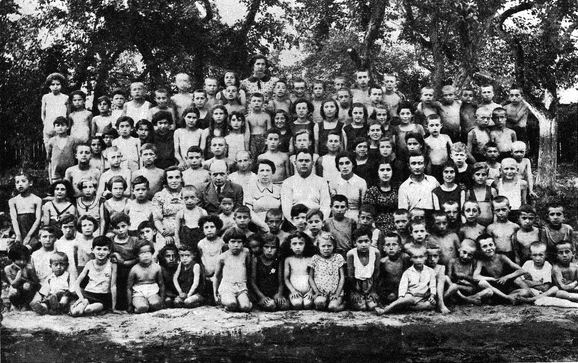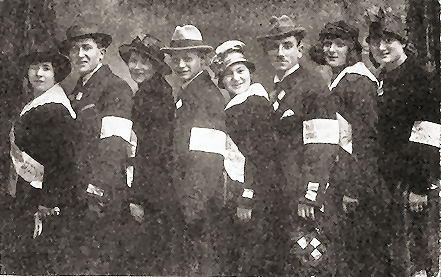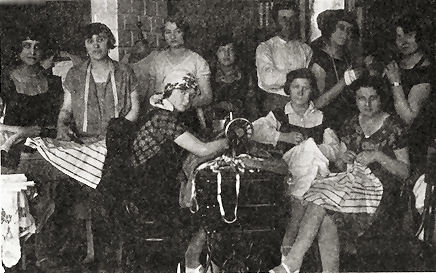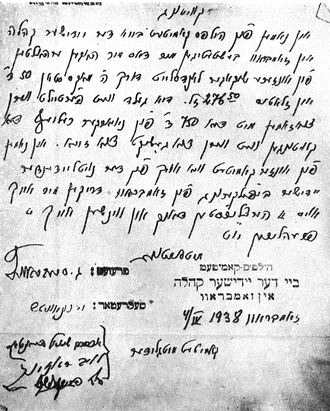|

In Memory of My Mother
By
Bezalel (‘Tsalkeh) Yellen
No
Yahrzeit candle, for my mother,
Will I light, no.
For I know not to where she has vanished,
I do not know where her resting place is.
I know not
where, I know not when,
In the city, the forest, during day, during night,
No one has brought your remains,
To a proper Jewish burial...
Perhaps,
my mother dear,
To the last breath, like a heroine,
You struggled with the enemy,
And fell to the desolate field?
Or did the
enemy, in a bunker,
Burn you alive,
When you uttered your prayer
And wrung your hands to God?
Perhaps,
mother, before death,
You mentioned the names of your children:
‘My children, you must remember,
And avenge your mother!’
I have not
yet places a Yahrzeit candle
For my mother,
I know not where, I know not when,
She left this world.
Every day,
beloved mother,
Your visage is before me,
So why say Kaddish and
Light a candle for my mother?...

On the Threshold of Doom

Jewish Soldiers Serving in the Polish Army

A Summer Resort for the Sick Children of the Poor from Zambrow,
under the Auspices of Centos

Centos
The Relief Society, Founded in Bialystok with the Aim of
Bringing Aid and Comfort to Orphans, Children and Youngsters in
General

The Last 5-6 Years
The last 5-6
years, before doom overtook the Jewish community of Zambrow, were
terrifying. The shine disappeared from this previously mentioned
town. The pride of the town’s youth vanished. It became a city of
the hungry, and the suffering, both physically and emotionally.
There were
no citizen’s rights, and no rights as human beings. The Poland,
which had not been liberated such a long time back, had become 100
times worse that the worst of the Czarist times. A Jew must pay the
highest taxes – but he has no right to demand even the most minimal
rights as a citizen. If a Jew had a small store, he has to pay all
sorts of taxes for it. But the government gives the right to the
worst hooligans from the village and the town, to stand at the door
of the store, and forcibly prevent anyone to go into the store and
thereby let the Jew earn something... legal, plain acts of a pogrom.
If the Jew mixes in – he is beaten, and the police do nothing about
it: because the Jew mixed in, and violated the law.. is the alibi of
the police, and more – a case is put together that the Jew has
insulted the Polish eagle, the Polish government – and deserved 3-5
years in jail, or being sent to forced labor (Каторга Работа) in
Kartuz-Bereza. The market days are a Hell.
In the good
years, the Zambrow shoemakers would provide about 75% of the normal
demand for boots by the peasants for the winter, in the surrounding
market days, and at cheaper prices during the summer. Both parties
were pleased by this: the buyer came home with a pair of new boots,
that were inexpensive, and the Jew – made a living. The same also
held true for a pair of trousers, a garment, a Boroshkov hat for the
winter, and a Maczewieka for the summer. After the merchandise was
robbed from the Jewish storage facility, and thee Jew beaten bloody
– they stopped coming to the fairs, and instead – sat and starved
with the wife and children.
A City Hungers
And if a
city hungers, everyone goes about in torn clothing, patches on the
patches, even on a Sabbath or a Festival holiday, and it is past the
point where anyone feels any shame. It is not possible to eat a bit
of meat even on the Sabbath, a glass of milk is not available even
for the children, a roof is not repaired, even if the rain comes in,
a broken window pane is boarded up with wood, even if it keeps out
the light of day, the oven is not kept warm, etc. Small Jewish
children complain, scrawny from ???, and the authorities have no
obligation to give help. The Sisters of Mercy with their large
crucifixes around their necks, who kneel before God and Jesus 10
times a day, and more – cross themselves, when a sick Jewish child
is brought to their ‘Holy Ghost’ hospital, and they cry out in
mercy: ‘przedziezh to zydek’ – ‘oh, it is, a Jewish child!’ And they
shut the door and do not permit admission...

Who Will Help Me?
And so, the
Jew of Zambrow raises his head heavenward and cries out: ‘From
whence will come my succor?’ – So it is with balebatim of
pedigree, and so it is with the craftsman, the manual laborer, and
the common laborer – the proletarian.
And from the
Land of Israel come Job’s messages. There are not a few scions of
Zambrow there, some well-situated with work, and in their business
undertakings, and there the situation is also critical: unrest,
assaults, the gates to the land are locked, the sea is a barrier.
The eyes are drawn to Zion, there is a striving to obtain release
from the Polish Hell – but now that hope is a small one.
However,
rays of light became visible from America: Zambrow scions there, are
not silent, and do not sleep the nights, and collect money for their
brothers and sisters in the ‘old country.’

The Help Committee in Chicago
And
ambassadors appear, unappointed ambassadors from amongst the Zambrow
scions in America. The Help Committee in Chicago and New York do not
abandon their brethren. Every month, a packet of dollars arrives to
be divided by the Hilfskomitet of the community, who helps
the poor without discrimination, especially the poor clergy and the
scholars, Linat HaTzedek, the Zambrow Sick Fund, which
supplied medicaments, doctors, nurses and sanatoria, ??? and healing
for the sick of the city from all walks of life, and the tireless
leader in these bad times, Shlomo Dzentshal, the son of Lejzor the
Butcher, who is the president and the father to all of these who are
suffering, The Women’s Society, that helps the poor women, women
going into confinement, etc., in their time of need. The Manual
Trades Society, whose Assistance Fund helps out the craftsmen,
enabling them to buy raw unfinished goods, on credit, and later to
pay this off with income and additional loans for new merchandise,
the Savings & Loan Bank, which gave loans to storekeepers to buy
merchandise, to balebatim, to repair a house, or pay taxes
that have been levied against them, and ‘last but not least – the
Centos, which provides Jewish children with bread and milk, shoes
and fresh air, and saves hundreds of children every year from ???
and the swollen bellies that come from malnutrition.

Shlomo Dzentshal and Max Stone
The dollars
arrive in the name of that decent public servant Shlomo Dzentshal,
the man of the people, and he distributes it among the various
institutions, and sends receipts back to the brethren in America. We
do not have the letters that the Help Committee in Chicago sent to
all of the Zambrow institutions. All have been lost along with the
addresses (??). However, we have read the thank you and request
letters from them to the committee in Chicago, which were received,
thanks to the warm-hearted, loyal and honest secretary, who would
answer everyone immediately and quickly sent the needed help –
landsman and brother Max Stone, who [in reality] is none other
than Mendl Finkelstein, the son of David Breineh-Pearl’s. I remember
him quite well, the skinny kid, with the small black, and constantly
darting little eyes. According to the letters sent to him – he
raised himself to the level of a Joseph in Egypt, who sent
sustenance to his brothers in the Land of Canaan...

From a Packet of Letters38
To flesh out
and illustrate our own words, we include here excerpts from letters
that Noah Slowik wrote to his brother Herschel in Israel, from the
community Hilfskomitet, from Linat HaTzedek, and from
Max Stone. Excerpts from other letters are included in the chapter,
‘Social Help.’
Jewish Zambrow Seethes...
...It was
just a few years back, and the city bubbled. On every street corner
there was a ‘Local’ for one or another youth group. Placards hung
everywhere, printed and hand-written, done artistically, and inform
you: There will be a discussion this evening. Here, a
literary-musical evening, there, a presentation, here a concert,
there a general assembly, elections, a report from a conference,
etc. Today – desolation. Everything has vanished, the youth has
fled. Those who remain – have hidden themselves. the Polish
authorities – do not permit one to raise one’s head. Two sport clubs
still exist, on a precarious basis: ‘HaPoel’ and ‘Gwiazda.’
The first belongs to a wing of the Israel Labor movement, and the
second, to the left-wing labor movement – who even Polonized their
name (Der Shtern has become Gwiazda.) They still compete with one
another: If one puts on a sports evening in white and blue, the
other puts on such an evening in red... From time-to-time, theater
groups still come from Warsaw. The people go to get a bit of life
from them... just recently we had the ‘Vilna Troupe’ ‘The Happy
Band’ and lastly, the good orator Rachel Holzer, before she left to
go to Australia.

Cultural Struggle Infuses Life...

In a Flower Day
A breath of
life was introduced by cultural competition... Our Rabbi had already
given up on the Yiddishist schools. No ‘nachas’ is ever going
to be gotten from their students. However, from the Hebrew schools,
there remains a possibility of salvaging something...
So the Rabbi
placed the Tarbut school with its teachers in excommunication. The
excommunication was carried out to the letter of the law, as it was
done in the Middle Ages: A set of Jews were called as witnesses in
the Bet HaMedrash, black candles were lit, the shofar was
blown, and the following was said: May you be cursčd by day, may you
be cursčd by night... The Agudah and the Revisionists were
supportive... the Revisionists did this to take political revenge:
their school had been liquidated, because the general Zionists and
Tze‘irei Tzion did not want to support it. This led to a
shouting match, and the Zionists called for a mass meeting, together
with the parents of the children and declared war on the Rabbi, and
provided evidence and justification from Poskim, that the
Rabbi had acted incorrectly... in the meantime, the Rabbi opened an
Agudah-School ‘Bet Yaakov,’ where the daughter of his second
wife was the teacher. This cause 30 girls from Tarbut to transfer
over to ‘Bet Yaakov.’ That night, the Zionist youth knocked out all
the window panes in the ‘Bet Yaakov’ school... and this brought a
bit of life back into the shtetl, a struggle between progress
and fanaticism...

‘Pickets’
Thing are
also not tranquil with our neighbors, the gentiles. Here, a pitched
battle took place between hooligans – from the villages, who had
come to impose that: gentiles should not buy from Jews. So long as
all they did was visit trouble on the Jews, nobody stopped them. The
police made believe nothing was happening, such as ‘picket’ – groups
of Poles who stand about and assure that no one enter a Jewish store
and buy something. If in this process, a Jew was beaten up, a window
pane broken, merchandise stolen – the police ‘didn’t see and didn’t
hear.’ However, when these picket-heroes began to push the politics
against the régime – the police intervened, and in the middle of the
market, a pitched battle took place and a policeman was knocked
down, a platoon leader. All the stores were immediately closed and
locked, and the police hid themselves... until police arrived from
Lomza, under the leadership of a Police Major. Forty police entered
the fray with city and village picketers, and mass arrests took
place. Full busloads of arrested people were taken off to Lomza. The
peasants fled the city, knocking out the window panes on Jewish
stores in the process... all of them were released, except for
twelve men, who had mounted a bloody resistance to the police, and
they were detained. As a result, ‘picketing’ was forbidden. However,
several weeks later, a delegation of Polish citizens from Zambrow
used its influence with Warsaw, to permit the renewal of ‘picketing’
against the Jewish stores, in which the picketers will make certain
not to instigate any sort of pogrom...

The Market

Cooperative Shop Operated by Young Seamstresses
What does
the market look like now? Of the 95% of the Jewish stores, barely
40% remain, and even these are looking for buyers to take them
over... almost every day, a Jewish store shuts down, Christian
artists, masons, carpenters, tear down the Jewish sign, and renovate
the store... not only businesses – also houses are going over into
gentile hands. Jews are thanking God for being rid of these meager
assets...the market that once was full of tables – ‘warehouses’ –
that were Jewish: bakers, kerchiefs ,soap, goods, shoemakers,
tailors, hat makers, pots & pans, furniture, etc. – there is no
Jewish footprint remaining...all gentiles...Only two or three
tables, off to the side, selling vegetables and fruit only to
Jews... The objective of the Poles is: to forcibly take away work
and sustenance [from the Jews, and provide it] for the unemployed
Christians. But the reality is – the place of the Jewish stores is
taken by the rich gentiles, who sell at much higher prices than the
Jews, giving bad merchandise, and the unemployed are afraid to speak
up...
January 12,
1933

Letter Facsimile April 4, 1938

Letter Facsimile
Hilfskomitet of the Jewish Community in Zambrow
To: The
Zambrow Help Committee in Chicago
In the name
of the Hilfskomitet of the Jewish Community of Zambrow, we
certify that we have received from our Chicago landsleit,
through Mr. Max Stone – 50 Dollars (and 276.50 zlotys). The money
will be distributed along with the $750.00 from the New York Relief
Committee. We will send them the receipts. In the name of our
committee, as well as the needy Jewish people of Zambrow, we express
our heartiest thanks to you, and our wished for a Happy Holiday.
Signed:
Gershon Srebrowicz, President
Y. Dunowicz, Secretary
Committee Members:
Abraham
Shmuel Fiontek
Leib Razing
David Finkelstein

Linat HaTzedek
To
Brother Max Stone, Secretary of the Help Committee of Zambrow
Landsleit in Chicago
12/12/ –
19,839
...We have
received the fifteen dollars through Mr. Shmuel Finkelstein. We are
devastated to hear of the death of R’ Zalman Goldman. We immediately
called an assembly of mourning, at which we read your letter. We
recognized and knew him, his good heart, and his devotion to his
Zambrow brethren. In the name of the Komitet and many poor and sick,
for whom this money will be used, we express our sorrow and wish to
convey words of consolation to the widow and the children: ‘May you
be comforted among those who mourn in Zion and Jerusalem.’ May they
know of no more ill tidings, and bereavements, and may they look
forward to a better day, and may we together fulfill the words:
‘From desolation to joy, from a day of mourning to a day of
happiness.’ We request that you send us the specific day on which R’
Zalman passed away, and the name of his father v”g, because we will
inscribe his name in the Pinkas of Linat Tzedek, and
on the day of Yahrzeit, we will hold a memorial.
In the name
of the Komitet:
Shlomo
Dzhenczal, Chairman
Yaakov Odem, Secretary
Letter II
12/7 – 1939
Dear Friend
Shlomo Dzhenczal,
I have sent
600 zlotys to you for the Zambrow Relief Society, to be divided
among the four organizations in Zambrow. The Women’s Society – 80
zlotys, ‘Linat HaTzedek’ – 80 zlotys, The Manual Trades
Society – 80 zlotys. To Centos, for the summer colony for the poor
children – 360 zlotys. I request that each of the organizations send
us an acknowledgment that they have received the funds, just like
they did last time.
Max
Stone
Letter III
24/7 – 39
Filled with
pain, I must inform you that we have had a great loss. We brought a
committed landsman to his final resting place, who lost his
young life, tragically, while at work. His name is Shepsl ben R’
Moshe Kalman Bass. The deceased was active in our organization, and
for a time was its treasurer. During his funeral, we gathered up the
money that we are now sending to you. We hope that the ensuing money
that comes to you from America, will come on occasions that are
happy. If possible, it would be appropriate if the children’s summer
colony this year be named for him in his memory.
In the name
of the Zambrow Relief Society
Menachem Stone, Secretary

The Beginning of the End
By Yitzhak Stupnik
I entered my
parent’s house. A note was already waiting for me on the table: I am
obligated to present myself to the military, in the Zambrow
Kuszaren.
At the
command post, I encountered no small number of my friends, who had
already put on military garb. We practically did not speak, we felt
what it was that awaited us...
The Jews of
the shtetl ran about with fear on their faces, trying to
provision themselves with food. Mothers stood at the corners of the
streets, bidding farewell to their children who were going off to
the front.
The Poles,
who all the time shrieked that we were aliens – ‘altered’ their
position a bit: our blood was necessary for the Fatherland.
We waited
for an order while in military formation. Finally, all of the
Zambrow Jews were allocated to one company, to be the first to go
into fire...we marched off to the East-Prussian border, during which
time the first of the German bombers appeared over Zambrow and
destroyed ľ of the city. We also suffered great losses at the front.
Our company lost 130 men, and returned with only 95 men. Then we
took up positions behind Nowogród. We dug ourselves into foxholes
covered with branches. When the German tanks were to ride over us,
we were supposed to blow them up at the point when they ride over
our concealed and buried heads...
I fell
asleep in the ‘grave’ while standing, after so many disturbing days
and nights. My father then came to me in a dream, with his white
head and gray beard, stroking me, and calming me: ‘Do not fear, my
servant Jacob,’ Do not be afraid, my child!...
Thereby, I
felt a strong movement in my shoulder: this was my commanding
officer, who had ordered me out of the ‘grave’ because the Polish
method of attacking German tanks is certain suicide... we began to
move back. It was before nightfall. The Germans detected our company
and shot it up. I was wounded in my right foot. We ran for the
entire night. Before dawn, with no strength left, without food or
drink – we saw that we were surrounded by the enemy...
The Germans
transported the able-bodied soldiers off to somewhere in Germany,
and the wounded were driven into the church at Jendziv. Despite the
fact that I had lost a lot of blood, I jumped the fence of the
church, and I went into the Bet HaMedrash of the little
shtetl, and here I encountered a Jewish family, who immediately
changed me into civilian clothing, and with a limp, set out to get
back to Zambrow. My parents greeted me with great happiness, ‘let
you be wounded, so long as you are alive!’ My parents were worried
about the fate of my two brothers, Yankl and Moshkeh, who were also
at the front, but had no news of them.
There was a
panic in the shtetl: the Red Army is leaving, and how long is
it before the Germans will kill all of the Jews. Accordingly, the
men all hid, and the confused women awaited the surprises of the
coming day. We lived in fear of death for two weeks, until finally:
the Germans drew back silently, without a work, to the west side.
The city remained in a state of chaos, no sort of citizen-militia
had been formed. the Red Army entered the city.
The Zambrow
Jews breathed more freely: all citizens are equal. Everyone has to
work. Collectives and cooperatives were created. Everyone worked at
their craft, and made a living. Jews that had no trade, were
employed by the Soviets and also earned their bread. Even the very
observant Jews, who were far from being in sympathy with communism,
saw, in the Red Army, a means to save the oppressed Jews. This
example serves to illustrate the fact: On the First of May, many
religious Jews marched with a red flag, among them: my father
Abraham Shmuel the Shokhet, wearing their long kapotes, etc.
This ‘Red
Paradise’ did not last long. The Russians drew back, and the Germans
took over the city. And it is hear that the destruction begins...

A Letter to the Land of Israel

Young People Obtaining Schooling After Work
The
Teachers are Sitting in the Middle: – Yehoshua Domb, Lola Gordon,
Bercheh Sokol, Nathan Stoliar, Pinia Baumkaler

When the Russians Occupied Zambrow
Zambrow,
8.1.1940
My dear son Aryeh,
... We think
about you, because we have not heard any news from you for a long
time. We received your last postcard. We are all well, and things
here are good, we feel free, and Jew and Christian are treated
equally...
Israel Kossowsky.
Dear brother
Aryeh,
... Fate (or
oversight) has spared us. Our family has not suffered from the war
and its aftermath. I have returned intact from the field. I obtained
work as a bookkeeper in a large business. Mosheki works as a
carpenter and Zalman is getting ready to enter the Jewish gymnasium
which is opening in Zambrow. You would have never believed this, we
have true freedom. Our house has remained intact...
Your
brother Yitzhak Kossowsky.

| 38 |
|
Translator’s Note: The Yiddish title uses
the rubric ‘A Bintel Brief,’ which is a name
associated with a famous column of letters published in
the Jewish Daily Forward. In its day, it was an
‘advice column’ that in subsequent times was given
reprise by the likes of ‘Dear Abby.’ I have
avoided this rubric in order not to cause confusion,
since this content has nothing to do with ‘A Bintel
Brief’ in the Forward. |
| |
|
|
| 39 |
|
A possible typographical error, in which
the year very likely was 1938. |
|